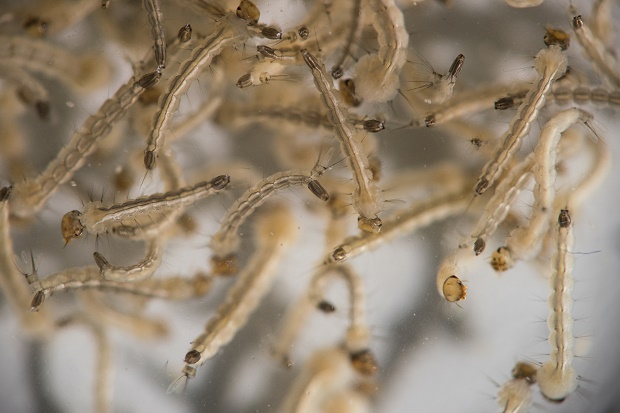
Aedes aegypti mosquito larvae sit in a petri dish at the Fiocruz institute in Recife, Pernambuco state, Brazil, Wednesday, Jan. 27, 2016. The mosquito is a vector for the proliferation of the Zika virus currently spreading throughout Latin America. New figures from Brazil’s Health Ministry show that the Zika virus outbreak has not caused as many confirmed cases of a rare brain defect as first feared. AP File Photo
CARACAS, Venezuela—Yurman Torres is standing in line at the foot of Avila mountain, on the edge of Caracas, to fill a large jug with water, a rare commodity in crisis-hit Venezuela.
The scarcity of water is just one of a long list of headaches for the struggling South American oil giant, but it comes with a particularly nasty risk.
As Venezuelans stockpile water in their homes, health officials warn, they risk fueling an expansion of the mosquito population, and with it the transmission of Zika, the mosquito-borne virus blamed for causing brain damage in babies.
READ: UN: Zika virus link to babies’ small heads ‘extremely worrisome’
“What can we do? We have to come here every day,” said Torres, 36, who fills two jugs every morning before going to work—just one of the daily hoops he jumps through to find the basic necessities in a country reeling from a deep recession and chronic shortages.
Venezuela, which hardly needed another problem to add to its triple-digit inflation and plunging oil revenues, has registered 4,700 suspected cases of Zika since the virus, which originated in Africa, began sweeping through Latin America last year.
READ: What to know about the tropical Zika virus in Latin America
And the official estimate for the number of cases is probably far too low, according to Julio Castro, a doctor and professor at the tropical medicine institute at Central University of Venezuela.
He estimates the real number of cases is at least 250,000.
The virus is transmitted by the Aedes aegypti mosquito, the same species that carries yellow fever, dengue and chikungunya.
It is relatively mild compared to that trio, resembling a mild flu with a rash.
But since it arrived in Latin America there has been a surge in babies born with microcephaly, or abnormally small heads. Health officials suspect the birth defect is being caused by expecting mothers catching Zika during pregnancy.
And the water crisis increases the risk, said Castro: mosquitoes breed in stagnant water, and the buckets and cisterns Venezuelans are using to ensure their water supply are ideal habitats within which the insects multiply.
“My daughter-in-law woke up this morning with what appear to be the symptoms,” said Maryori Magallanes, a 50-year-old teacher, as sanitation workers fumigated her house for mosquitoes.
“I have a niece who’s pregnant. They say there’s a substantial risk. They ought to fumigate constantly.”
More than just drought
The Venezuelan legislature, which the opposition recently wrested from leftist President Nicolas Maduro’s party after 17 years, has passed a motion calling for increased efforts to stem the crisis and warning that the country’s 18 largest reservoirs are nearing minimum levels.
In Caracas, cistern trucks line up to load water normally used for public parks and deliver it to parched households.
The government has introduced rationing, blaming late rains.
“Since 2013, the rainfall volume has been 45 percent lower than in previous years,” said Water Minister Ernesto Paiva.
But the problem is more than just a drought, said the former president of Hidrocapital, the public water management firm for the north of the country, the area hardest hit by the shortages.
Venezuela is home to one of the largest rivers in the Americas, the Orinoco, but has only built two new reservoirs in the past 18 years—not enough to keep up with population growth, he said.
Venezuela “has stopped making the necessary infrastructure investments that would guarantee water supplies,” he said.
Meanwhile, Venezuelans have little choice but to stockpile water at home—one of the biggest problems in the fight against Zika, according to one of the researchers who first identified the disease in Latin America, Brazilian virologist Gubio Soares.
“There’s no water so people keep containers full of it, which is a breeding ground,” he told AFP in Salvador, in northeast Brazil, at the epicenter of the outbreak.
“Most mosquitoes today are reproducing inside the home.”